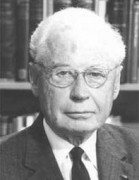Awards
- Honorary Degree - 1972
- D.S.
- Doctor of Science
- Commencement
- Indianapolis, Indiana
- Presenter: John William Ryan

Albert Baird Hastings was born in Bellevue-Dayton, Kentucky on November 20, 1895. He moved to Indianapolis with his family at the age of 6 and graduated from Shortridge High School with highest honors in 1913. Dr. Hastings' scientific career began at the University of Michigan, where he received a B.S. in physical chemistry in 1917. He immediately entered the University of Michigan Graduate School; however, World War I interrupted his graduate training, and he took a job as a "sanitary chemist" with the Public Health Service, studying fatigue. After the war, Hastings completed his graduate education in 1921 at Columbia University where he received a Ph.D. in physical chemistry, having studied acid-base balance as affected by exercise.
Following postdoctoral studies with Donald D. VanSlyke at the Rockefeller Institute, he joined the faculty of the University of Chicago Department of Physiological Chemistry. In 1935 he became professor and chairman of the Department of Biochemistry of the Harvard Medical School. During his 25-year tenure, the department rose to its internationally recognized preeminence. The achievements of his students and younger faculty associates provide the best measure of the environment, which he created at Harvard, and of the inspiration, which he instilled into their lives. Generations of medical students were influenced to think biochemically about medicine through his lectures and in his personally conducted laboratories.
Professor Hastings' research in fluid, electrolyte, and acid-base balance; the mechanism of interaction of oxygen with hemoglobin; and calcium metabolic control of animal tissues set the stage for understanding the mechanisms of a variety of human disease states. Following his retirement from Harvard in 1959, Dr. Hastings continued to be active in research for another 20 years, first at the Scripps Clinic and Research Foundation in La Jolla, California, and then at the University of California at San Diego School of Medicine. Some of Hastings' research was featured in a Journal of Biological Chemistry Classic.
Although teaching and research were his primary vocation, Professor Hastings was a major figure in a wide variety of national scientific committees. He served on the World War II Committee for Medical Research of the Office of Scientific Research and Development. During his service on this very influential committee, he received from President Harry S. Truman the National Medal of Merit, which was at that time, the highest civilian decoration of the United States awarded by the U.S. President to civilians for exceptionally meritorious conduct in the performance of outstanding services. In the ensuing postwar years Hastings was a member of four National Institutes of Health Councils and the Committee on Biology and Medicine of the Atomic Energy Commission.
Dr. Hastings served as president of the American Society of Biological Chemists (now called the American Society for Biochemistry and Molecular Biology) from 1945 to 1946. Additional accolades include being elected to the National Academy of Sciences in 1937; being awarded the Banting Medal of the American Diabetes Association in 1962, and receiving a U.S. Public Health Service Citation Ribbon for his lifetime contributions. As well, he received the honorary degree of Doctor of Science from the University of Michigan, 1941; Harvard University, 1945; Oxford University, 1952; Boston University, 1956; and, St. Louis University, 1965.
Professor Hastings passed away on September 24, 1987.